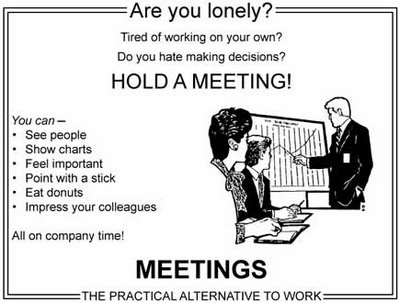Having grown up in an house that eschewed waste, I’ve naturally come to abhor a lack of efficiency in pretty much everything I do, especially at work. And when you’re running your own business or managing a startup, nothing eats into productivity and money like the time wasters that are often a part of many large and small businesses.
So when I came across a post by David Shedd, I not only agreed completely, I also had to re-post it here. So here goes:
We know what most of these time wasters are. They have been the same for years.
Why then are we so incapable of rooting them out?
The Challenge
The difficulty in rooting out time wasting activities in most businesses is that these tasks, done in moderation, are important, even vital, to the functioning of the business. As such, they cannot be eliminated entirely. Alas, these activities are often no longer being done in moderation; they have been taken to the extreme. They have progressed from being something good to being something detrimental to the success of the business.
The Time Wasters
- Yearly Budgeting and Forecasting: The usual 3 – 4 months’ process in most companies is a morale-sapping, number crunching exercise in determining how to be precisely wrong. Quick sanity check: Are you really going to be able to estimate sales precisely for Q4 2012 in August 2011.
- Re-Forecasting: This month by month activity when your numbers are below budget needs to be all but eliminated. If your forecast the previous month was off, what special insight did you gain in the last 30 days to make certain that this month’s forecast is going to be any better?
- Meetings: Weekly staff meetings and weekly sales meetings are the biggest time wasters. Is anybody really listening to the other person as they drone on about what they have done? If you “have†to have such meetings, make them stand-up meetings lasting at most 15 minutes. Even better, hold the meetings only when you have something to say.
- E-Mail: This includes excess E-Mails of all types especially the use of cc: and bcc: (blind copy). These last two are the ultimate in corporate “protecting your butts.†If you are not communicating with them directly, do all these other people need to know what you are saying? Do they really care? The other pernicious time-waster is the constant checking of E-Mails which many of us seem to do every 20 minutes just in case somebody sent us something in those 20 minutes that will rock our world.
- Internet and Cell Phone Usage: In moderation, both of these tools are essential for doing research and for communicating. Alas, today, they are way over-used and just suck time out of everyone’s days. Checking news and sports scores and calling family and friends are the two most obvious examples.
- Detailed Corporate Financial Analysis – This includes the weeks and months’ long detailed project analysis or acquisition analysis. Having a basic plan and basic understanding of the financials of any project is vital. This can usually be done in a day or two. The rest is just window-dressing and pure speculation to justify and make pretty a decision that has already been made.
- Quarterly Earning Preparation:Â In public companies, the stock analysts expect that the CEO and the CFO know everything that is going in the business. With any company larger than (say) $100M, that just cannot possibly happen. So, executives and finance departments waste endless days tracking down and answering possible questions that might be asked to ensure that the top dogs look as if they have their finger on the pulse of the business.
- Sarbanes-Oxley – The legislation is enough of a time waster without the CFO and accounting departments’ extreme over-reaction to the legislation making things even worse. Enough said.
- Profit Improvement Initiatives: With three or fewer initiatives going on, these can be useful and get done. When leaders and their staff get initiative – happy, they just become time wasters as the people in the trenches respond to non-sensical requests and run around to make sure it looks as if they are following up on all 15 “vital†initiatives they are supposed to be accomplishing.
What Needs to Be Done?
-
Eliminate Anything Unneeded and Unimportant: Nothing pressing on the agenda for the weekly staff meeting? Then don’t hold the meeting.
-
Minimize Tasks: The key concept is the 80 / 20 rule. 80% of all the value comes from only 20% of the work. For budgeting and forecasting, get 80% of the value, but spend only 20% of the time on it. Will it be perfect? No. But, guess what? It is a forecast or budget. With the uncertainty in the world, close is as good as it is going to get.
- Set Up Limits: Limit the number of initiatives to 3 or fewer. Make meetings shorter and stick to the time limits; this helps move things along and ensure that the focus is only on the most important. Force limits on time spent on E-Mails or the Internet to avoid these activities becoming “time sucks†that crowd out doing other, more important (if less pleasurable) tasks.

